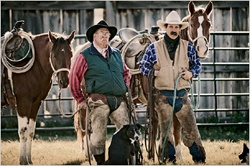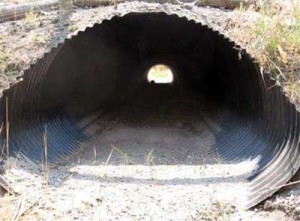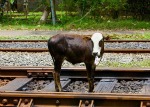We have much more to do and your continued support is needed now more than ever.
Cows and trains don’t mix: Ranchers stand up against the Tongue River Railroad in second public hearing
Yesterday, the Surface Transportation Board (STB) staff members moved down the valley to hold public scoping hearings in Forsyth, MT after meeting with the Northern Cheyenne in Lame Deer on Monday.
They met a similar level of opposition to the railroad as they did in Lame Deer as ranchers whose land would be crossed by the proposed Tongue River Railroad, ranchers who already have a railroad on their land and citizens worried about increased rail traffic stood up and told the STB staff that they were against the Tongue River Railroad. Citizens laid out a litany of issues that the STB must analyze in the Environmental Impact Statement. Over 20 people stood up and spoke out against the rail line with only one person speaking in favor of it.

Ranching for dummies
How do you explain to a non-rancher why trains and cows don’t mix? It’s not as easy as you’d think. Take for instance the Tongue River Railroad Company’s original proposal to the ranchers along the route for cattle crossings. Instead of an overpass, they proposed metal culverts about 11 feet wide running underneath the rail line.
Cows and tin tubes

“A cows not the smartest animal in the world. And she looks at the tin culvert and thinks, I might fit in this side but that far side is only about this big (Wally put his hands up in a tiny circle) and I’m not gonna fit in it, (crowd laughs) and if she finally decides that she can make it through there, her calf is smarter than she is and he/she won’t go….”
Wally then explained to the STB that he had tried to tell this to their Office of Environmental Analysis years ago when he was trying to protect his ranch. He wanted them to put in a bridge and wrote the STB. The STB wrote him back and said,
“Cattle will learn to go through a cattle pass.”
Wally wrote them back and said,
“Apparently you aren’t acquainted with our cattle, the first time you try to mash Rocker 6 cows through a tin tube, that they don’t think is big enough, I want you all to show up on your best horse to help us because we are going to need all the help we can get.”
Wally got no response. Either they don’t have very good cow horses out there at STB Headquarters or they don’t have a sense of humor, or maybe both.
Cows on the train tracks

“[Union Pacific] would rather pay for dead cows than maintain the fences,” Topham tells us. “It’s an economic decision.”
As all ranchers know, fencing is one of the largest expenses they have. One mile of fence is costing around $8,000/ mile. So, although the Tongue River Railroad company maintains that they would put a fence up along the entire route to keep livestock from hanging out on the tracks, we know that it is inevitable that fences will fail and cows will be killed. It will be cheaper for them to pay for dead cows than to maintain expensive fence. It is 83 miles of rough and rugged country, with many places having no access. How often will the TRR Co check the fence line to make sure it is ok?
There are more examples of trains hitting cows here and the whole train derailed, and here, and here.
Wildlife concerns raised
Besides the litany of issues related to ranching and trains that the public brought up, ranchers also brought up wildlife issues.

“The river bottom is the restaurant, the hills are the motel”
He pointed out that the train would go right between the restaurant and the motel, preventing the elk, deer and myriads of other critters from having an undisturbed migratory path. He was extremely concerned about how the rail line would impact the wildlife on his ranch that he works to protect and conserve. He told the STB that the Tongue River is one of the most pristine river valleys in the United States and is the most rich wildlife ecosystems in Montana.
He went on,
“There are a lot of jobs in the construction, manufacturing, marketing and distribution of the poison pill that will kill America. That poison pill is the export of our natural resources. The state of Montana, Arch Coal, and BNSF will all make a lot of money, but it will be at the expense of the best places we have left.”
A Public Good?
One of the most consistent themes of the night from almost every person that spoke was that a private corporation is asking to condemn and confiscate private property for corporate profits and yet the railroad company is trying to portray this a “public good.”
In order for the Tongue River Railroad to be granted the powers of eminent domain by the government and be able to take private property for their coal train they have to show that what they are proposing to do is in the interest of the the public.
I don’t know about you, but I don’t think a coal company making billions of dollars in profit, condemning land and shipping Montana’s coal to Asian countries is a “public good.”
Is the STB willing to actually consider the “no action” alternative?
At the end of the evening, after listening to two hours of people telling the STB staff what impacts they will see on their land, their health and their communities, I decided to stand up and ask them one question that I think all of us deserve to know the answer to.
Is the STB willing to say no to the Tongue River Railroad Company? What amount of environmental impacts do they need to see and hear about before they are willing to say, you know what, this railroad has too many problems, will destroy too much land, will harm too much wildlife, will cause too much destruction, and we aren’t going to give the Tongue River Railroad Company a permit to do this damage.
Are we just going through the motions or will the three members of the Surface Transportation Board have the political courage to say no?





















